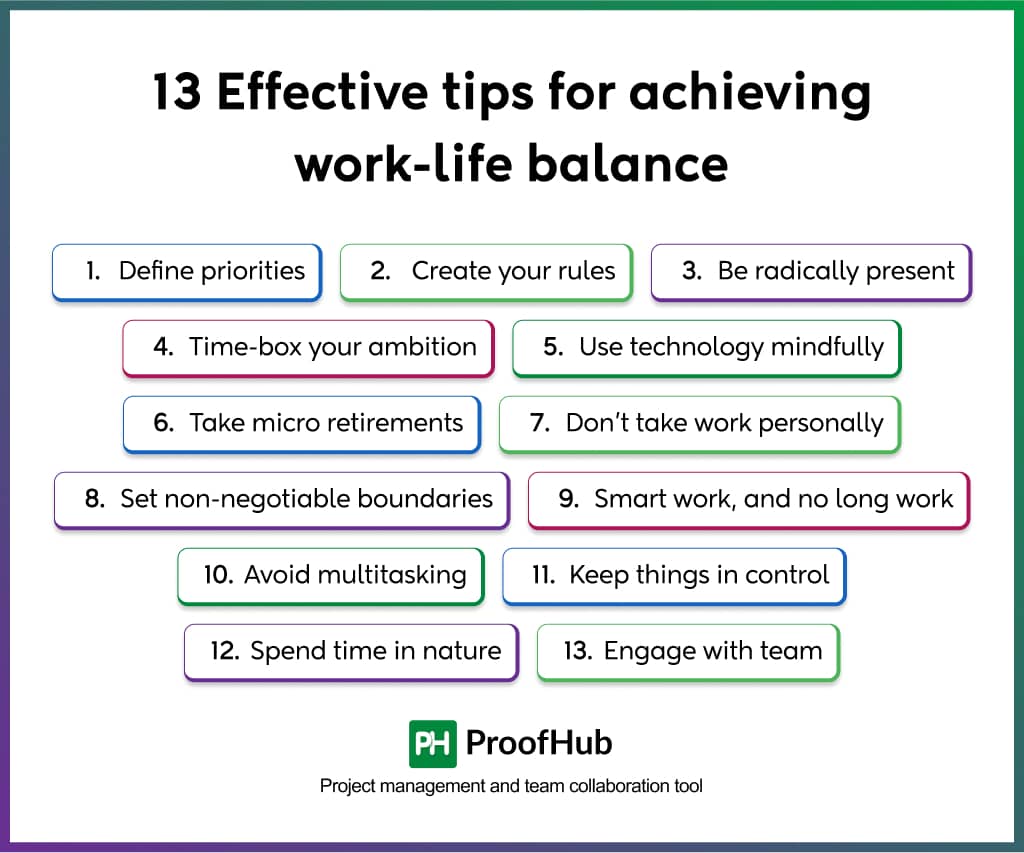Work-life balance has become the talk of the town these days.
From normalizing the company’s demanding work culture to employees advocating for flexibility and well-being, I come across diverse yet controversial viewpoints while scrolling through news articles, online forums, and conversations with my peers.
Considering the complexity of today’s workplace dynamics, I understand that the concept resonates differently with people based on circumstances, values, and even generational outlooks. But to me, work-life balance is not a one-size-fits-all solution!
Instead, it is a dynamic approach to designing a life where both suits complement each other; and all it requires is for you to be intentional and adaptable.
Here are my 13 effective work-life balance tips to help you keep up with work commitments while maintaining integrity on the personal front.
What is work-life balance?
By definition, work-life balance refers to the extent to which harmony exists between an individual’s work and personal life. It is how they allocate and manage their time, effort, and energy to meet respective obligations while showing up as their best selves – both at and away from work.
To put it the right way, an individual with a healthy work-life balance knows when to detach from work and focus on other priorities. Be it relationships, family duties, friends’ gatherings, or any fulfilling hobby, they are fully engaged and present in the moment. It is a reflection of their job satisfaction, productivity, and overall well-being.
Why is work-life balance important?
Work-life balance counts not just your attentive working hours, but the energy, peace, and focus you take with you whether or not you are in the office.
A recent controversy sparked when a company’s leaked email on the termination of stressed employees went viral, causing widespread backlash and outrage from the public. While later on the CEO issued a clarification on the entire incident to be an intentional marketing stunt, the uproar is enough to highlight the severity of the issue.
Work-life balance is a sensitive topic. Organizations need to realize that an imbalanced lifestyle can spoil the physical aspects of the workplace. It is vital to create an environment that promotes the well-being of the team and happiness as well. Here are some of the reasons why work-life balance should be prioritized by organizations:
- Improved well-being: When you maintain a harmonious balance between work and personal life, you are less prone to experiencing stress, burnout, fatigue, and mental exhaustion. Which means, you have more energy to get things done and maintain a positive outlook.
- Higher productivity: Being productive is never about extending working hours or trying to achieve the same output as you would have worked. Instead, when employees feel refreshed, they can focus better and make concentrated efforts to achieve efficient results.
- Reduced employee turnover: Spending too many hours working can push employees to their breaking point, causing them to look for other opportunities in organizations where they feel valued and supported. The fact that 33% of highly satisfied employees commit longer to stay in their current organization, substantiates promoting balance.
- More creativity: When your life is balanced and you are content with your personal and professional goals, creative ideas flow freely, and solutions to problems emerge more effectively. You are better equipped to bring fresh perspectives to work, which otherwise may remain hidden behind stress and exhaustion.
- Positive emotions: Hesitating to take on responsibilities, being afraid of failures, and feeling frustrated and drained are some apparent signs of experiencing emotional imbalance. On the contrary, when positivity prevails, you look forward to navigating challenges and making the most of opportunities.
What causes poor work-life balance?
Several factors disrupt the delicate equilibrium of personal and professional life, making it difficult for individuals to unplug and recharge. These issues often stem from workplace dynamics, personal attributes, or societal pressures. Below are some common parameters that contribute to the work-life interface.
- Excessive workload: Piling up tasks and responsibilities on employees’ desks, without assessing their workload and availability, is one of the prevalent reasons employees end up stretching their work hours. This added pressure consumes their mental energy and peace, leaving no time for self-care or leisure outside work.
- Unrealistic expectations: According to our recent LinkedIn insights, 40% of respondents voted unrealistic expectations to be the most prominent barrier to work-life balance. Setting impractical deadlines and goals puts immense pressure on employees, deteriorating not just their physical and mental, but emotional well-being as well. It leads to them feeling overwhelmed and drained, stagnating their ability to perform effectively.
- Long working hours: Many companies expect their employees to dedicate the majority of their time to work, taking away their opportunity to contribute to relationships, hobbies, and personal growth outside the work. Not getting enough time for sleep and relaxation costs employees not just their overall health and productivity, but results in increased absenteeism and high turnover rates, impacting business performance.
- Lack of boundaries: With the rise of technology and scattered work setups, the fine line between work and personal life often gets blurred. Whether it’s responding to a quick work-related message or checking emails during personal hours, the constant urge to stay connected and responsive disrupts personal routines and contributes to mental fatigue.
- Hyper-perfectionism: Seeking flawless results is fine but when it gets to the overwhelming stage of being a perfectionist, progress becomes stalled. The obsession over small details paralyzes your ability to perform to high standards, causing you to experience delays, frustration, and missed opportunities for innovation.
13 Effective tips for achieving work-life balance
Picking up from where we left off, I couldn’t emphasize more that a balanced life is designed and not found. Self-reflection is key. It requires you to reflect on your inner state, articulate clear expectations, and set healthy boundaries.
“It’s time to give yourself a break, embrace the life you have, and make adjustments that will allow you to grow in the areas that are crucial to your most important commitments as well as your happiness.” — Dan Thurmon
Achieving balance is a pursuit of exploring what works for you, adopting personalized strategies, and playing around with them to design a balance that truly benefits you.
Here are 13 effective tips you can mix and match to make work and life coexist without friction.

1. Define priorities – professional and personal life
Setting the priorities of your life – both professional and personal is crucial to making intentional choices and reflecting on our deepest commitments – be it family dinners, health goals, or any professional milestone.
Not only does it help you focus, but gives another person clarity on what and how much they can expect from you. By valuing your time, you can make others respect your space too. By doing this, you are able to turn down distractions, filter out noise, and avoid spreading yourself too thin.
2. Create your rules
Once you have clearly defined your priorities, make some consistent rules to achieve them. Don’t be lenient. Commit yourself to your goals, relentlessly.
Make it a rule to keep your work at work and forget about your boss when you are at home. A mental on-off switch between work and home keeps all the distractions away. Remember, prioritizing and defending your mental health, time, and serenity is in your hands.
3. Be radically present
Commit yourself to being fully present. Whether playing with kids at home or nailing a deadline in the office, be in the moment. Immerse your thoughts, mind, and subconscious in the process. Doing so, you become super attentive to notice even the smallest details that you otherwise would miss.
Listen with intent, understand with context, and respond thoughtfully. When you are fully attentive at work and engaging deeply, you minimize errors and maximize results. Achieving this level of mindfulness and presence requires practice and discipline, helping you achieve deeper relationships, improved focus, and greater fulfillment.
4. Time-box your ambition
We all know time is finite. But what about our ambitions and goals? These are infinite and chasing them down for too long can cause you fatigue. Regardless of the fact that being ambitious is essential, being mindful of the extent to which you can take over your life is critical.
My advice would be to set boundaries and designate specific time frames for work-related hustles. Challenge yourself to complete tasks within that window. Having said that, do not let the grind consume you to the extent that life becomes imbalanced.
5. Use technology mindfully
Technology is everywhere and has a profound impact on both productivity and leisure. While it has proven evidence of driving innovation, improving efficiency, and connecting people across the globe, being mindful of its usage to create value is crucial.
Turning off unnecessary notifications, limiting screen time, automating email replies, and avoiding mindless scrolling are some practical ways to reclaim time for priorities and activities – both personal and professional.
6. Take micro retirements
The concept of taking micro-retirements is my personal favorite strategy to balance the work-life edge without tipping into burnout. It is like a cognitive reset to stress management.
When you take purposeful breaks, whether it’s stepping out for a stretch, stepping out for fresh air, going out for treks, or a single day away from the office to simply reset – these pauses create a great opportunity to improve your focus, boost energy levels, and prevent occupational burnout in the long run.
7. Don’t take work personally
Work can feel personal, especially when you are deeply invested in achieving meaningful outcomes. But here is the thing: your work is just one aspect of who you are – it doesn’t define you as a person.
Learn to detach yourself from your role. Do not let the criticism dominate your thoughts, erode your confidence, or make you defensive. Instead, view feedback objectively and as an opportunity for growth rather than a personal attack. Keep work and personal identity separate to never lose sight of the bigger picture. And most importantly, avoid taking this baggage home.
8. Set non-negotiable boundaries
Establishing clarity on your work limits does not make you less committed to work in any manner. Instead, by defining your limits, you prevent yourself from overcommitting and experiencing burnout.
When you consistently uphold your boundaries, you not only safeguard your well-being but also encourage others to value and respect your time, promoting a harmonious and healthy work-life balance.
9. Smart work, and no long work
Less work does not equate to less productivity. While long hours may be seen as a badge of dedication, they often leave you no scope for relaxation and recharge.
“You don’t have to make yourself miserable to be successful. It’s natural to look back and mythologize the long nights and manic moments of genius, but success isn’t about working hard, it’s about working smart.” —Andrew Wilkinson
Overworking to impress others, meet deadlines, or chase personal ambitions isn’t a sustainable practice – it’s a fast track to an unhealthy work-life balance. Instead, adopting a smart approach to work can help you achieve efficient results in fewer working hours. The strategy leaves you room for personal fulfillment and life outside of work.
10. Avoid multitasking
Multitasking often does more harm than good and does not necessarily work for everyone all the time. Juggling multiple tasks at once dilutes the quality of our efforts and outcomes.
By focusing on one task at a time, you not only enhance efficiency but also reduce mental clutter that lingers beyond working hours. This clarity of focus allows your mind to transition smoothly from work to personal life, ensuring you remain present and at peace in both spheres.
11. Keep things in control
To keep your work and personal life in sync, take charge of your time and priorities. By leveraging the right tools and strategies, you can structure and organize your schedule that ensure tasks are completed with efficiency without disrupting your personal commitments
One of the best ways to achieve this balance is by using simple project management software. These tools help you organize tasks, maintain to-do lists, prioritize effectively, and do more to stay productive during work hours. When you keep things under control, you prevent work from spilling over into your personal life.
12. Spend time in nature
You can’t ensure the best quality results by simply staying locked into the office, glued to your computer, and working under harsh fluorescent light. True ambition thrives in the great outdoors.
Spending time in nature offers a much-needed escape from the constant hustle. It’s in the quiet of nature that you reconnect with yourself, gain fresh perspective, and recharge your mind and body. By stepping away from the pressures of everyday business, you obtain much-needed rebalance.
13. Engage with team
Whether in or away from the office, maintaining strong connections with your team is crucial for promoting collaboration. Engaging with your team allows an opportunity for open communication, mutual understanding, and a supportive environment where everyone feels valued. Participating in team-building exercises is a perfect method to develop a much-needed sense of teamwork around the office and relaxation as well. These activities encourage relaxation, boost morale, and create a sense of belonging, helping you and your team achieve a better balance between professional demands and personal well-being.
How can managers help employees achieve work-life balance?
Managers play a crucial role in creating a workplace where employees feel fulfilled, productive, and most importantly, balanced. By taking intentional actions, not only managers can support their employees, but can also create a physically and mentally sound workplace for themselves. Here are some effective strategies you can apply to obtain a ’balanced leader’ tag for yourself:
- Encourage family and personal involvement
In remote working environments where personal and professional lines blur, managers can support inclusiveness by showing an understanding of family dynamics – such as children appearing on video calls or the occasional background noise. Also, by hosting family-inclusive events or allowing occasional family visits, you can create a sense of belongingness at the workplace
- Respect working hours
Don’t be the manager who holds meetings or assigns tasks at odd hours just to keep employees on edge; unless it’s important. Keep in mind that everyone has a life outside of work too. So, schedule tasks and meetings within standard working hours. Also, encourage them to leave at their scheduled time without guilt, setting an example for healthier work habits.
- Encourage time off
Your work may be demanding, keeping you always busy, but grinding at work without taking off seems like a constant hustle. Each day steps up with unique work demands, keeping you always busy, eroding emotional well-being and mental clarity. However, by encouraging your employees to take vacations, without the fear of being judged or increasing workload upon return, you can help them disconnect to realign and rejuvenate.
- Redefine productivity metrics
Do not glorify overtime; instead, promote efficiency and output-focused achievements. Appreciate smart work and not just hard work. Redefine productivity as a parameter that values outcomes over hours worked. This shift can inspire a healthier, more sustainable work culture and improved employee retention.
- Connect on a personal level
Professional relationships like your personal ones, require nourishment, care, and support. Acknowledge employees’ struggles and challenges by showing genuine support, sharing your own experience, and providing solutions. By making efforts to know your employees beyond their roles at work, you can connect with them on a deeper level and build stronger workplace relationships.
Conclusion
Professional and personal lives go hand in hand. While a significant portion of our time is spent working, it should not consume the quality and richness of our personal lives. Recognizing imbalances is the first step to rectifying the strain they create. To achieve a balance between work and personal lives, you need to make deliberate efforts and mindful adjustments.
Work-life balance is not a one-time practice that is going to fall into place overnight. Some days will feel seamless and fulfilling, while others might leave you stretched thin to the extent of burnout and drained. The process can be slow, but never impossible. Being consistent is the key to stopping your life from crumbling into chaos and exhaustion. Stay committed, and over time, balance will become a sustainable reality.
FAQs
How do you manage work-life balance in a remote job?
While 71% of workers claim to have a good work-life balance in remote settings, this working style has its own side of challenges. Whether it’s distractions at home, inability to follow strict working hours, or increased workload, these factors can disrupt work-life balance. However, to keep work and personal life separate while working remotely, you can
- Create a designated space at home to keep your work mode on
- Schedule your work hours and break mindfully
- Switching off from work once the day concludes
- Avoid multitasking and concentrating on one task at a time
- Prioritize important tasks during peak productivity hours and push back less-critical tasks
How does work-life balance affect productivity at work?
Work-life balance has a major impact on workplace productivity. Balanced individuals are content in their personal lives, and approach work with greater concentration, focus, and effort. This way they can maintain consistent performance and obtain extraordinary outcomes.
What are the long-term effects of poor work-life balance?
The long-term effects of poor work-life balance extend far beyond stress and burnout; they creep in to diminish job satisfaction, raise fatigue and anxiety, and lower motivation. Not just on the professional front, but poor life balance also strains personal attributes, leaving employees little room for self-care and nourishment.
Is the work-life balance the same for everyone?
Of course not! Work-life balance is not the same for everyone. The significance of the term is greatly influenced by several factors including, personality, preferences, roles, values, circumstances, and even generational outlook.

